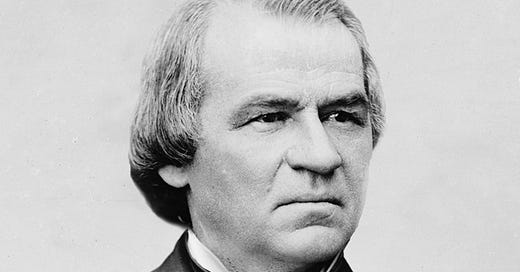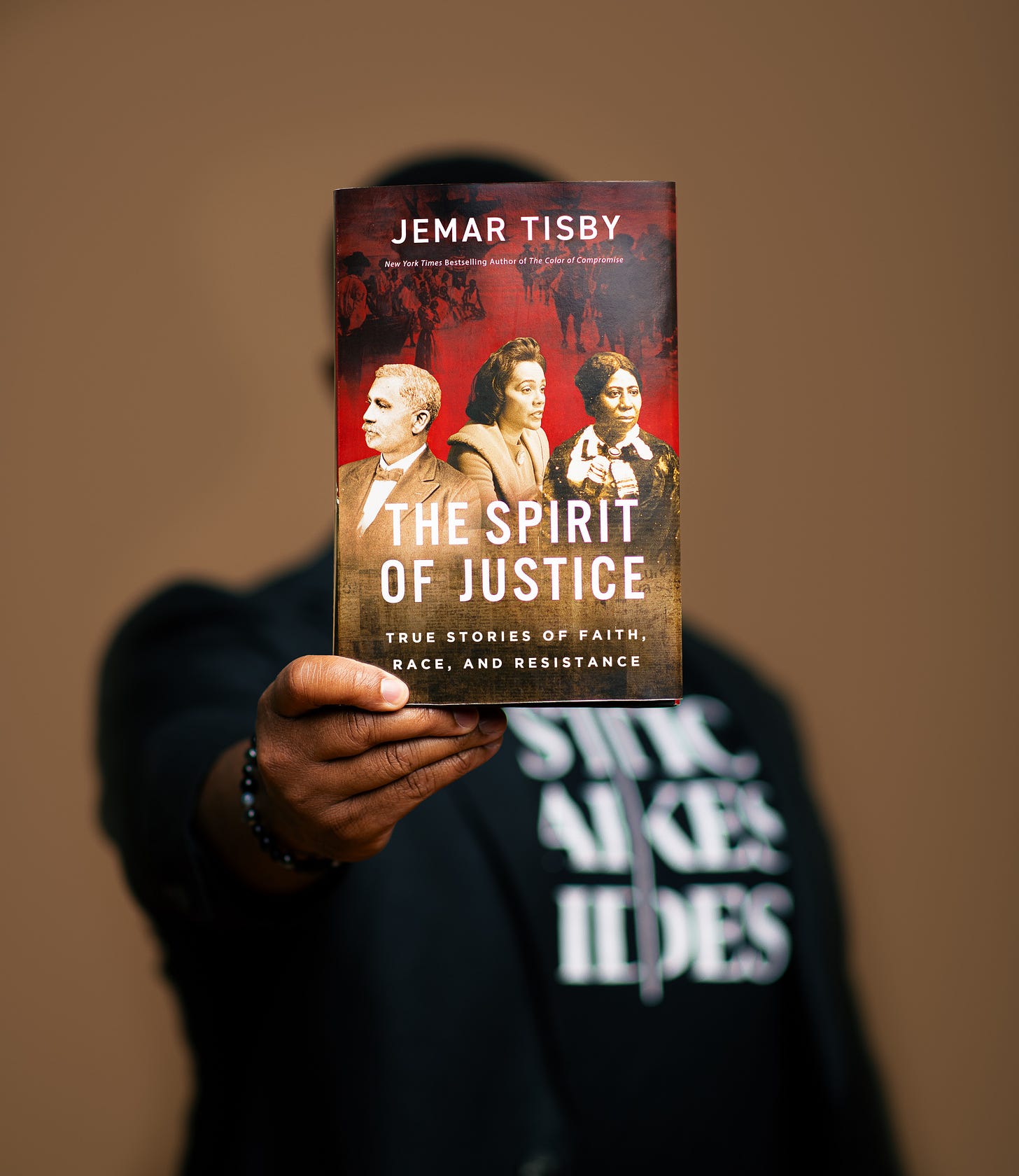The Supreme Court Repeats the Folly of the Post-Civil War Presidency
A failure to hold rebels accountable undermined democracy and progress in the nation.
I can’t believe we’re supposed to learn about this Supreme Court decision, and just proceed with our daily lives. I couldn’t do it. So I wrote about it. I need your help to keep sharing these perspectives. Consider becoming a paid subscriber today.
Andrew Johnson took over the presidency after the assassination of Abraham Lincoln in April 1865, and he changed course of US history...for the worse.
Johnson’s affection for the South led to his leniency with the Confederacy.
In 1865, he issued a “Proclamation Pardoning Persons Who Took Part in the Rebellion.” While it would have been tedious to the point of impossibility to individually try every Confederate soldier, and there were some exceptions to the proclamation such as anyone above the rank of colonel or those who left their seats in Congress to join the Confederacy, the amnesty was broad and had a low bar.
Such forgiveness, Johnson wrote, would, “tend to secure permanent peace, order, and prosperity throughout the land, and to renew and fully restore confidence and fraternal feeling among the whole people, and their respect for and attachment to the National Government, designed by its patriotic founders for the general good.”
The proclamation further stated:
[I] do hereby proclaim and declare unconditionally and without reservation, to all and to every person who, directly or indirectly, participated in the late insurrection or rebellion a full pardon and amnesty for the offense of treason against the United States or of adhering to their enemies during the late civil war, with restoration of all rights, privileges, and immunities under the Constitution and the laws which have been made in pursuance thereof.
The conservative majority of the Supreme Court of the United States (SCOTUS) just pulled an Andrew Johnson.
While not a legal pardon, SCOTUS essentially signaled to former president Donald Trump and all his allies that it would be very difficult to prosecute him for attempts to overturn the lawful 2020 presidential election.
One summary explained the decision this way…
In a historic decision, a divided Supreme Court on Monday ruled that former presidents can never be prosecuted for actions relating to the core powers of their office, and that there is at least a presumption that they have immunity for their official acts more broadly.
The decision left open the possibility that the charges brought against former President Donald Trump by Special Counsel Jack Smith – alleging that Trump conspired to overturn the results of the 2020 election – can still go forward to the extent that the charges are based on his private conduct, rather than his official acts.
The case now returns to the lower courts for them to determine whether the conduct at the center of the charges against Trump was official or unofficial – an inquiry that, even if it leads to the conclusion that the charges can proceed, will almost certainly further delay any trial in the case, which had originally been scheduled to begin on March 4, 2024 but is currently on hold.
President Joe Biden called the decision a “terrible disservice to the people of this nation.”
“Each, each of us is equal before the law. No one, no one is above the law, not even the president of the United States,” Biden said.
Justice Sonia Sotomayor issued the dissenting opinion in powerful prose.
Today’s decision to grant former Presidents criminal immunity reshapes the institution of the Presidency. It makes a mockery of the principle, foundational to our Constitution and system of Government, that no man is above the law. Relying on little more than its own misguided wisdom about the need for “bold and unhesitating action” by the President, ante, at 3, 13, the Court gives former President Trump all the immunity he asked for and more. Because our Constitution does not shield a former President from answering for criminal and treasonous acts, I dissent.
She went on to write, “Whether described as presumptive or absolute, under the majority’s rule, a President’s use of any official power for any purpose, even the most corrupt, is immune from prosecution.”
She summarized by writing, “The main takeaway of today’s decision is that all of a President’s official acts, defined without regard to motive or intent, are entitled to immunity that is “at least . . . presumptive,” and quite possibly ‘absolute.’”
As a historian, I find chilling parallels between the SCOTUS decision to grant broad immunity to a president and Andrew Johnson’s lenient treatment of former Confederates.
In each case the lack of accountability served to embolden the perpetrators.
Brian Stevenson, founder of the Equal Justice Initiative, has said, “The North won the Civil War, but the South won the narrative war.”
By this he meant that the lack accountability for seditious acts resulting in rebellion and secession granted cover for the former Confederates to continue in their ways.
The story of racial superiority never went away because it was never sufficiently repudiated or punished. So racial prejudice continues to shift and morph to plague this country and its people even 160 years after the Civil War.
By issuing this decision regarding presidential immunity, the conservative majority of the Supreme Court virtually guarantees that an unscrupulous politician who ascends to the presidency can take nearly any outlandish and illegal action and not face any consequences.
If the political history of this nation has any lesson to teach us right now it is this: The lack of accountability for high crimes and misdemeanors only compounds the original harm and ensures injustices in the future.
No one should be above the law, especially the President of the United States.
What are your reactions to this most recent SCOTUS decision?
If you’re feeling deflated and discouraged right now (as I am), history gives us hope. I talk about the people who endured and resisted under slavery, the Civil War, the Jim Crow Era, the Civil Rights era, and more. Learn about them when you pre-order The Spirit of Justice: True Stories of Faith, Race, and Resistance.






As always, thank you for the work—continuing to show up, bringing trustworthy analysis to our nation in regression (or folly freefall). Your Andrew Johnson comparison is spot on. Peace and courage.
I was thinking last night that the immunity decision ranks with Plessy v. Ferguson in institutionalizing political preferences that disrupt society for generations. Hopefully, we won’t wait for 50 years for a corrective like we did until Brown v. Board came along.